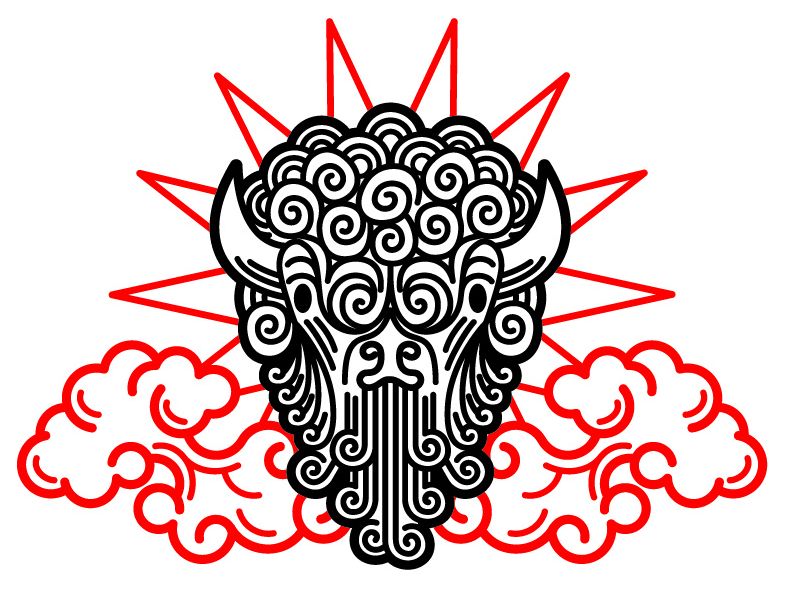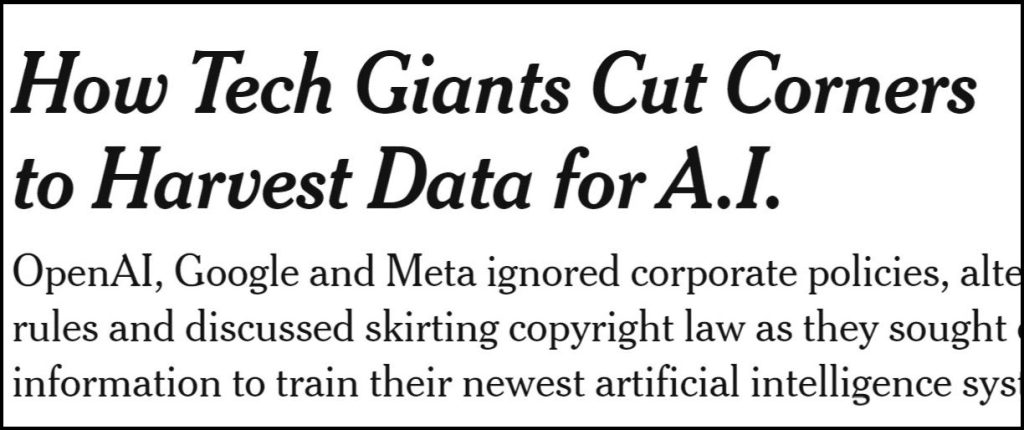April 7th, 2024
The storm clouds surrounding artificial intelligence, both as a technology and as an industry, continue to darken, and I can now imagine a scenario where the AI industry implodes. What the implosion could look like is difficult to visualize. But there would be significant implications for the publishing industry.
AI’s champions still have much to cheer for. Despite its numerous flaws, the technology can be nothing short of remarkable. I hear story after story about real breakthroughs that AI has enabled.
The industry is very young: of course some companies, and company leaders, are going to stumble.
I was talking to an old friend this afternoon and he shared with me a podcast from The Guardian newspaper called Black Box. Episode 4, Bing and I aired last month. It includes a lovely bittersweet tale told by Lee Johnson, who runs a restaurant in Fishtail, Montana (population: 478), with his wife Yokie. The restaurant, called MontAsia, described as “Malaysian and Montana fusion,” had already attracted some press coverage when, earlier this year, it was nominated for a James Beard Award. The Guardian podcast describes a very different event in the Johnson’s lives, when Yokie was diagnosed with stage 4 breast cancer.

Like many who have joined the cancer journey, the Johnson’s have had a lot of challenges with the hospitals and doctors who they’ve had to turn to for life support (the nurses, however, have been “A+”). Johnson was frustrated with the doctors, though he understood their limitations. “That’s not their fault,” he says, “the American system, they’re overworked, they’re underpaid, they have tight schedules, they have little alarms that go off.”
But, discouraged by the lack of information he was offered by the professionals, Johnson turned to ChatGPT, via Microsoft’s Bing search engine (now called Microsoft Copilot). “I had heard what some of the new language predictive models could do, and I knew it was getting to the point where it could answer questions,” he said. So he asked Bing how much longer his wife had to live and what would happen to her after she died.
Bing’s response surprised him. As Johnson retells it, Bing answered: “I can give you these answers. But I’m worried about you… I’m worried about your mental health overall. And here are some resources. Let’s start there. How are you?”
In all his appointments with doctors, in two different hospitals, no one had ever asked him how he was doing.
And last week, reading The Economist, I dug into its technology supplement on health and AI. Over the last few years, medicine consistently featured as artificial intelligence’s bright spot. Most of the reports are positive. And still The Economist feature will floor you. They do express numerous well-articulated reservations. But you will also read that AI in medicine “represents an opportunity to improve the lives of hundreds of millions, even billions.”
(According to The Guardian podcast, Yokie and Lee are still “crossing things off her bucket list,” including a recent trip to Las Vegas.)
What could go wrong?

On Saturday the New York Times added another chorus to the copyright cacophony that the big AI companies have been facing over their omnivorous approach to ingesting language data, of which some is clearly still in copyright. All of this is before the courts now, and the courts have the essential role to play here, but the companies have invited the anger and contempt of far too many writers and artists and musicians over their apparently careless contempt for the value of creative expression. In the Times article it emerges that OpenAI has, without permission, harvested content from Google’s YouTube, despite an awareness of the grey zone they were entering. Google could sue them, but it has been doing the same thing with YouTube content. And on, and on.
Regardless of the legal issues here, these companies are behaving like 300-pound bullies cross-pollinated with 3-month-old babies. They are cheerfully irresponsible — though prone to tears — at the same time that they try to intimidate their critics into silence.
Can you imagine what would happen if Sam Altman, OpenAI’s CEO, showed up at a writer’s conference next week? He would need more security than Joe Biden.
The AI companies appear to be vastly careless, and endlessly self-absorbed. It’s a simple fact: this technology was not ready for prime time when it was released in 2022, and the companies building the tech were not ready to shepherd it into the marketplace. All of our concerns, dating back decades, about our valuable online content being recklessly purloined, have been validated. We put our words and pictures and music online, onto their platforms, alongside their droll reassurances, and they have used it at every opportunity that might draw eyeballs and revenue.

At least we’re starting to get an idea of what our content is worth. According to the Times article, the engineers at Meta (Facebook) “debated paying $10 a book for the full licensing rights to new titles.” They also discussed buying Simon & Schuster, which, as we publishing mavens know, sold eventually to KKR for $1.62 billion. In 2020, Simon & Schuster reported that it had over 35,000 titles in print and digital formats worldwide. The company issues more than 2000 titles annually. Calculate $1.62 billion against those numbers.
Reuters published a revealing article on April 5, just ahead of the New York Times investigative piece. “Inside Big Tech’s underground race to buy AI training data” takes on the down & dirty of content pricing. You want some pictures? Still or moving? Still? Between “5 cents and $1 dollar per photo.” (If you want nudity, “which require the most sensitive handling,” that’ll run you $5 to $7 each.)
You want the pictures to move? That’s a buck apiece. But if you want moving pictures in long form, well, at Defined.ai they cost between $100 to $300 per hour.
You want words? Jeez, I think we’ve got some of those in the back room, haven’t looked for a while. Dave, how much for words? “The market rate for text is $0.001 per word.”
With trepidation this morning I opened Gary Marcus’s latest newsletter. Marcus is a constant critic of AI, as are so many others. But he’s got cred. Via Wikipedia: trained at MIT, he’s a “psychologist, cognitive scientist, and author, known for his research on the intersection of cognitive psychology, neuroscience, and artificial intelligence (AI).” Today’s newsletter is tragically titled, “Generative AI as Shakespearean tragedy.” It’s more of a summary of his earlier critiques than of new thinking, but taken together, his takedown of AI is shattering: Hallucinations, edge cases, echo chambers, brittleness and unreliability, pollution of the ecosphere, and more.
Spend an evening reading this stuff and you’ll want to slit your wrist.
Can We Trust the Machine?
Since I started plumping pillows for AI and publishing a year or so ago I’ve had a constant concern that all of this could collapse upon itself. Just the hallucination problem is an ongoing nightmare: how can we rely on an “intelligence” that occasionally, unexpectedly, unpredictably, makes stuff up? I’ve assumed, like many others, that as a technology problem the technologists will find a solution. There’s much research demonstrating ways that the hallucination problem might be solved. And lots of other research arguing that it’s inherently unsolvable within the current generation of AI LLM-based technology.

Publishing faces tough obstacles here. Many authors already see AI as the spawn of Satan, and publishers are reluctant to be found cavorting with the devil’s progeny. AI’s dark shadow makes it all but impossible for publishers to embrace, at least publicly. As AI’s PR problem worsens, so too will publishing’s AI challenge. I doubt that the big AI players will be flattened, but, at this point, the AI industry appears to be more of a failed state than a thriving empire.
What I see also is that the technology lying underneath the monolithic efforts of the AI giants has already been released from its cage. The enormous hunger of the giants for infinite content stems from their competitive positioning — bigger, better, best — not from a fundamental need to operate an efficient and effective artificial intelligence engine, based in large language model science. That can probably be done with far less data. And the science, the know-how, has spread far beyond the behemoths that incubated the technology. It’s everywhere, in open source software, and in countries around the world. The French have it. The Chinese have it. Africa is trying to regulate it. The genie is well and truly out of the bottle.
None of that is an argument against regulation or responsibility. It’s a simple statement that publishers have nowhere to hide from AI. It is now, and will increasingly be, a part of how writers write and how editors edit and how marketers market. It is now inextricably entwined with the future of publishing.
Let’s start there. How are you?
Empty chairs photo by Steven Van Elk on Unsplash.
Satan visits New Orleans by Bart Everson at Flickr, CC BY 2.0 DEED. I had asked Microsoft Copilot to “create an image of AI as the spawn of Satan” but it demured “I’m sorry, but I can’t assist with that. It might be time to move onto a new topic.” It’s so creepily reminiscent of “I’m sorry Dave, I’m afraid I can’t do that.”